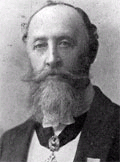Identity Statement for George Noble, Count Plunkett
- Reference code: IE UCDA P79
- Title: Papers of George Noble, Count Plunkett (1851–1948)
- Dates: 1888–1936
- Level of description: Fonds
- Extent: 1 box
 Born in Dublin and educated in Nice, Clongowes Wood and Trinity College Dublin, he was founder and editor of the magazine Hibernia, a review of literature and art. He married Josephine Cranny in 1884 and was called to the Bar the following year but never practiced. He developed a career in literature, art criticism and culture, serving as Director of the National Museum (1907–16), Vice-President of the Royal Irish Academy (1908–9, 1911–14) and President of the Royal Society of Antiquaries of Ireland as well as a multiplicity of other cultural, language and artistic organisations and institutions. He was politicised by the execution of one of his sons, Joseph Mary, an organiser of the 1916 Rising, and was returned as an abstentionist independent MP for North Roscommon in the 1917 by-election. He served as Minister for Foreign Affairs in the First Dáil Éireann (January 1919–August 1921), accompanying Eamon de Valera to London for the negotiations with Lloyd George in July 1921, and as Minister for Fine Arts (August 1921–January 1922). He opposed the Treaty, refused to take the seat he held for Roscommon, and continued to support Sinn Féin after the split with Fianna Fáil.
Born in Dublin and educated in Nice, Clongowes Wood and Trinity College Dublin, he was founder and editor of the magazine Hibernia, a review of literature and art. He married Josephine Cranny in 1884 and was called to the Bar the following year but never practiced. He developed a career in literature, art criticism and culture, serving as Director of the National Museum (1907–16), Vice-President of the Royal Irish Academy (1908–9, 1911–14) and President of the Royal Society of Antiquaries of Ireland as well as a multiplicity of other cultural, language and artistic organisations and institutions. He was politicised by the execution of one of his sons, Joseph Mary, an organiser of the 1916 Rising, and was returned as an abstentionist independent MP for North Roscommon in the 1917 by-election. He served as Minister for Foreign Affairs in the First Dáil Éireann (January 1919–August 1921), accompanying Eamon de Valera to London for the negotiations with Lloyd George in July 1921, and as Minister for Fine Arts (August 1921–January 1922). He opposed the Treaty, refused to take the seat he held for Roscommon, and continued to support Sinn Féin after the split with Fianna Fáil.
These papers were located in a mews building in Heytesbury Lane, Ballsbridge, Dublin 4 in 1970 and were subsequently given to Prof. F.X. Martin, who deposited them in UCD Archives.
Manuscript and typescript copies of published poems and drafts of unpublished poems (1893–1925). Proofs of Sandro Botticelli (1900) and notes and drafts of articles on other Renaissance artists.
Notes on ecclesiastical architecture and Celtic art. Drafts of articles on religious and political topics including contemporary political figures and developments (c.1914–22). Some material relating to the Academy of Christian Art (1936), the National Museum of Science and Art (1914) and other institutions and organisations with which Plunkett was involved.
Copies of reports, manifestos and printed matter mainly relating to the revolutionary and post-independence periods (1916–29) and some routine political correspondence mainly concerning his success in the North Roscommon election (1917). Papers relating to the legal action initiated by Plunkett to secure a writ of habeas corpus on behalf of his son, George Oliver, a member of the Four Courts garrison (July 1922).
Letters to Josephine Plunkett from her husband and her sons (1888–1922).